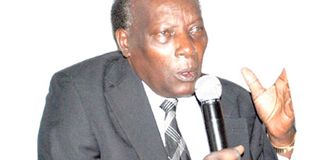Could it happen in Uganda?

Prof George W. Kanyeihamba
What you need to know:
At the end of last month, South African president Jacob Zuma constitutionally reshuffled his cabinet. In the reshuffle, he dropped and replaced the minister of finance and his deputy, among others. The deputy president, Cyril Ramaphosa, was among the first South Africans to publicly protest vehemently.
Yesterday, following a reshuffle of Cabinet by President Museveni, Vice President Edward Ssekandi angrily marched into the President’s office and said: “Your Excellency, with the greatest respect, you have made a terrible mistake to remove hounarable Kapere from the Ministry of Defence. In my opinion, he has been the best minister we have ever had in Uganda.”
“I know it is your prerogative to appoint, dismiss and reshuffle Cabinet ministers, but on this occasion you are wrong and from here, I am going to address a press conference and denounce your decision because it is not in the national interest. Moreover, I have heard about the reasons which led you to reshuffle Cabinet. They are mistaken and unfounded in fact and law. Actually, they are absurd.”
If this were to happen in Uganda today, how many hours or days would Ssekandi last before being axed from his post? Down south in South Africa, name calling and defiance of president Jacob Zuma by his compatriots have become a common feature of governance.
Not long ago, it was announced that president Zuma was going to give a state-of-the-nation address. Members of the opposition in parliament decided to embarrass and prevent him from delivering it.
On the appointed day, with the debating chamber of parliament full to capacity, the opposition endeavoured to execute their plan and began to address parliament themselves, displaying slogans denouncing corruption in government.
Zuma was interrupted and shouted at by the members of the opposition constantly. There followed scuffles and riotous chaos in the chamber watched by the whole world to the embarrassment of the government.
Had South Africa been some other African country where democracy, the rule of law and human rights are not permitted, the protesters would have been mishandled, arrested, detained or subjected to a worse fate than detention.
At the end of last month, Zuma constitutionally reshuffled his cabinet. In the reshuffle, he dropped and replaced the minister of finance and his deputy, among others. The two ministers were said to be among the incorruptible, hardworking and competent members of cabinet.
The deputy president, Cyril Ramaphosa, was among the first South Africans to publicly protest vehemently. He stormed into the president’s office and told Zuma what he thought of the reshuffle and scathingly criticised the dropping from cabinet of the minister of finance who the deputy president described as the ablest and most industrious in the government.
He then informed the president that he would not let the matter rest there; He would address the press about his displeasure because of the president’s terrible mistake.
I recall a few similar incidents in the past. The earliest was when the late former president Milton Obote reshuffled Cabinet in the first UPC government and removed Felix Onama, who was a powerful minister holding the portfolio of Defence.
Onama refused to move out of Defence and the story goes that he sent a rude note to Obote reading: “Why do you not yourself go and occupy the ministry where you want me to move to?”Onama stayed in Defence and Obote kept quiet.
The other story is when former president Lule summoned then army commander, the late David Oyite-Ojok, to the president’s office for consultations and the latter declined reportedly, saying he had better things to do defending the country. In the majority of cases, the practice in Africa is for the chief executive to be obeyed unconditionally.
Two years ago, a VIPPU commandant was given instructions to introduce two police constables to a senior government minister so that the latter could select one as a resident guard. The VIP and the commandant decided to test both constables how they would react to orders given by their superior officers.
Constable James was interviewed first, after welcoming him and knowing his name, the VIP asked him: “Supposing your commandant were to order you now and say, this minister has committed very serious criminal offences against me, he even seduced my wife. I came to punish him. I now order you to shoot him dead, so that I avenge myself. What are you going to do?”
James quickly responded, “Since my commandant is a superior officer, I will shoot you immediately because this is a command of a superior officer.” James was directed to wait outside while his colleague Alfred would be interviewed next.
The same question was put to Alfred who responded as follows: “I would not shoot you Sir.”
Then the VIP said, “How can you disobey a superior command?”
Alfred quietly said, “But Sir, this is an illegal order and we were taught not to obey illegal orders because if we do, we will be committing a crime ourselves and would be held personally responsible.” Guess who became the resident guard?
Lastly, could it be possible in Uganda that the Supreme Court could do as the Venezuela supreme court did to declare parliament anti-people and seize their legislative powers? This is impossible and in any event, both supreme courts would be wrong and their decisions null and void, but is it not a wonderful dream?
Prof Kanyeihamba is a retired Supreme Court judge. [email protected]




